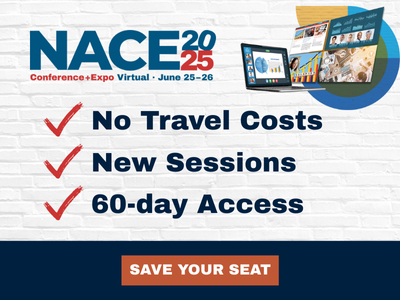Hyster-Yale Materials Handling is developing a pre-onboarding program to engage and build excitement among its interns prior to their start date next summer.
Megan C. Moore, Hyster-Yale’s campus talent acquisition advisor, is currently working on a preboarding plan that includes:
- A message campaign with text images to keep interns excited;
- Emails with facts about the company and how their role will add value to the company;
- Tips for soft skills that the interns will need; and
- Resources for them to explore in preparation.
“The campaign will also feature other special engagements to keep our interns excited to come work with us,” Moore continues.
Moore’s role was newly created by Hyster-Yale to oversee its internship program.
Hyster-Yale recognizes the importance of having someone to coordinate and manage their overall internships. Their focus is to have a central hub for their internship program,” she says.
Prior to this, Moore spent more than two decades in public education: 19 years as a math teacher and the last three years as an instructional technology specialist. She brings a drive to learn and understand as she has been researching intern engagement, attending webinars, and meeting with managers at Hyster-Yale’s locations to identify needs.
“I have collected a good amount of information and ideas,” Moore explains.
“As I'm building the pre-onboarding program, I take it back to my education experience, where we want to find that connection with our students. Before I taught a lesson, I wanted to build background, see what the students knew, and get them engaged to generate excitement and trust.”
Interns making that connection with Hyster-Yale reinforces their decision to join the company and helps them feel like they're already a valued part of the team before their first day, Moore says.
“It lays a foundation for a smoother onboarding experience, and when the interns do arrive on their first day, they have a sense of purpose and a readiness to contribute to their teams,” she notes.
Her research includes, for instance, what types of communication Gen Z prefers and their values.
“I found that this generation of students like images and videos, so we’re looking at the possibility of incorporating more of this into our pre-onboarding,” she points out.
“And we want our interactions to reflect the values that are important to them. We want to be intentional about what we’re presenting.”
Hyster-Yale’s pre-onboarding is a nine-week program with different themes. While the program has not been finalized, Moore says that weekly themes might include a welcome, a spotlight on the organization’s culture, an introduction to the interns’ teams, industry insight, and so forth. Sprinkled in will be opportunities for the interns to actively participate by, perhaps, offering planning ideas for their onboarding week or taking part in social media challenges.
Moore envisions Hyster-Yale’s pre-onboarding program dovetailing with the company’s post-internship engagement schedule. Following the internship offboarding at the end of the summer, Hyster-Yale will undertake what Moore calls its “encouragement period,” during which the company wishes its interns well in the upcoming semester and then maintains ties by sending regular messages as they begin their next semester as well as through the year-end holidays and into the new year.
“We have another period of encouragement for the spring semester built in, which then brings us right back to pre-onboarding in mid-February. It’s a cycle,” Moore explains.
“We want our underclass interns to return for another internship, maybe try out a different department to find what they like best. And we want to convert our seniors to full-time employees. That’s the ultimate goal, so every intern will get our encouragement for whatever the path they are on.”
She also stresses that a pre-boarding plan is not static. Instead, it's a fluid process that must evolve to remain effective as the interns’ interests and values change.
“If you look back through generations, you see these changes in each one. In addition, new technologies and ways of communicating are introduced, so you can’t feel that your pre-onboarding plan is ever final,” Moore says.
A key component of this effectiveness is looping feedback into the process.
“Whether it’s in that encouragement period or your offboarding period or a regular part of your internship program, you want to make sure that you are continuously gathering input from your interns and stakeholders to refine and improve the program,” Moore notes.
After all, for many students, an internship is their first experience in a corporate environment, and it can be daunting.
“Connecting with them, engaging them, and getting to know them as they are getting to know us can help alleviate their nervousness,” Moore says.
“Pre-onboarding is not just a retention strategy; it's a way to set the tone for the internship experience. A well-executed pre-onboarding program reflects the organization’s commitment to its interns, their personal growth, and their integration into the company's culture. Interns who feel prepared and valued are more likely to become engaged employees and advocates for our brand. In the end, this all fosters repeat internships and conversion to full-time employees.”






